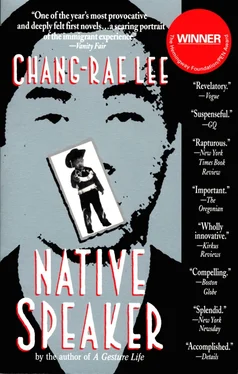“It wasn’t raining in the city?” I said to her, my grand greeting.
“I guess it was,” she said, pulling the scarf off her head. “Why?”
“No umbrella.”
“Shit!” she said, her hand wiping the fogged window. The train was already rolling north. “My third this week!”
I started driving. “Was it a good one?”
She sighed lightly. “I don’t know. It cost two dollars. I’ve been buying them like candy from those guys on Broadway, you know, the ones who suddenly appear on the corner with huge boxes of umbrellas at the first drop of rain.”
“The Nigerians?” I said.
“I guess so.” Then she was quiet, as though taking care in her head. “Not that it matters. But does it even rain in Nigeria?”
“In certain parts, I think. I think a lot. Maybe I’m wrong.”
“I guess it makes sense,” she said, relaxing now.
I looked at her.
“Desert peoples being sensitive to rain,” she said.
“That’s right.”
Two hours later she was stirring a pot of her lamb stew. I sat at the kitchen table, which I had set with my mother’s good service and cloth napkins and glasses for water and wine. Lelia took her usual care preparing the dish, parboiling the meat first and then adding chopped vegetables to its simmering stock, and then dropping a clove of garlic in the pot and then one more clove after some deliberation, then the herbs, the aromatics, and then letting the whole thing stew, at first covered, later not. The soup was on from the moment we arrived at the house — she called ahead so that I could buy the ingredients — and now she tippled in a final splash of sherry, a few drops of Worcestershire, and then took a taste of the gravy from a wooden spoon.
“Not bad,” she said, wiping her mouth with the back of her hand.
It was my favorite dish. She made it often when we first were married. We even got into a habit of making love toward the end of its cooking so that when we were done and spent and a little famished it stirred thick enough to ladle into deep bowls and eat at the foot of the bed. My crotch smelled salty and sharp with her and bleached with me, and the rich pungent meat of the lamb was an offering passing between us. Somehow the tastes held an inner logic. Then, we fed each other with big spoons; somehow hers always tasted different from my own. When we finished we crawled back into bed and belched and joked and curled up and slept it off. Lelia always worried that in ten years we would be fat and dull and maybe by then even have a big-screen TV. I remember telling her no, there would be a kid or two or three to keep us slender, jumping forever.
Lelia said she was working out again with Molly. With her sleeves pulled up I saw the new bands in her arms as she chopped and minced. I noticed the muscles running along her forearms and the tightness in the tendons of her hands. She kept unkinking her neck like it was stiff. She and Molly went to one of those health clubs down in the financial district, the rooftop of a glass-and-steel number, where the bankers and lawyers went at lunchtime to sweat off breakfast and look for that night’s action at the juice bar. It’s for my heart, they would say, unstrapping sopped Rolexes from their hairy wrists. I could see Lelia and Molly humoring one of them until he suggested the three of them go somewhere; then they might work him over before he even knew what happened and he had to go back to the speed bag with a malice to figure it all out.
With all the chopping and peeling we weren’t talking much yet, but it didn’t seem to bother her. The stew was almost done and there was nothing left to do so I opened the bottle of burgundy and started pouring.
“Not too much for me,” she said from the sink, her long back sort of slow-dancing. “I’ve been getting headaches lately. I think it’s those sulfites.”
“You never had a problem before,” I answered, giving her a little more than half a glass.
“I didn’t know about sulfites before,” she said, looking back and grinning. “Molly has literature on it.”
She wiped her hands in a dish towel and sat down next to me. “Besides, we’ve got a lot of work to do tonight.”
“Tonight? We’ve got all tomorrow off.”
“I want to get started, Henry. You know me.”
“Okay, but let’s not get crazy.”
“We won’t get crazy.” She carefully sipped her wine.
The house had lain pretty much fallow since my father died. Lelia had already worked on the house once, this a while ago, after his funeral, so we could sell off the things we didn’t want or need. We were actually planning to move up there for good, to leave the city, which neither of us was actually enjoying much anymore, if we ever truly had. But then the strangeness between us began, the feelings of oddness and misplacement, and our move never happened. If we still had had Mitt, of course, we probably would have moved anyway, so he could go to a better public school, have some grass to play on, and we’d have figured out our problems later. Or maybe another baby might have helped us. Another try. Of course, that’s the worst reason to have a child, anyone on the street can tell you that, because no one can handle being an attempt at something from the very start.
I couldn’t help her with the house that first time. I was on assignment in Miami and had to return there immediately after his funeral. I asked Lelia to take care of the place — I didn’t think I could do it anyway — and she said sure, she’d do it, she could live there for the week and commute to work until I got back. In truth, she didn’t like staying for too long in our apartment alone. The place was too breezy, had too many echoes.
In my father’s house she felt safe. I think the place reminded her of her childhood home in Brookline, Massachusetts, though that one was much more expansive than my father’s house, to a point palatial, with separate living wings for her mother Alice and Stew. Lelia’s parents needed that kind of space. They fought a lot; Alice wasn’t so afraid of things then. They’d start hollering somewhere in the middle of the house, assail each other furiously, then retire to their corners and start drinking.
Lelia liked houses that you could go all the way up and hide yourself in, high stretching houses with garrets, widow’s peaks, secret attics. That’s why she loved our garage so much, with its secret room. It didn’t matter to her if the rest of a house were empty and creaky and dark as long as she was lodged above it all, in a nook with a pitched ceiling and a lamp, her books and a writing pad ready on a table. In the same spirit she liked to climb trees, could still ramble up the bark of one with complete ease and confidence, though she had a deep, running scar on her lower back from falling through the branches of an oak tree when she was nine.
And just last week, on one of our brief visits together, while we were picnicking in Central Park, I made her angry with some stupid comment about Stew or Mitt or something, and after we fought a little she got up without saying anything and climbed the tree we were sitting under. I wanted to go up after her, grab her in the branches and shake her, I was burning to drag her back down, tussle and overcome her, but then I could never bring myself to climb beyond that first large branch, not from the height, but somehow I could never abide the subtle sway of living limbs, stake anything on their pliant strength. I just watched her until she reached the smallest branch that would bear her weight. She gazed straight down at me from almost twenty feet, unquivering, wordless, her hair rubbing against the branches, hanging those narrow bare feet out into the air.
The week after my father’s funeral Lelia slept in the room Mitt occupied his last summer, when he decided he was old enough to live by himself in the big house. My father — who could display amazing properties of emotional recovery — had long before cleared it of any signs of our boy, removing not just his few toys and summer clothes but all the furniture and wall hangings. He’d even painted the room, from its sky blue to a barren, optic white. Now done , I can still hear him thinking.
Читать дальше












